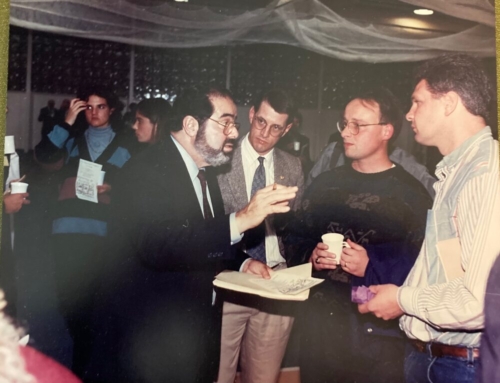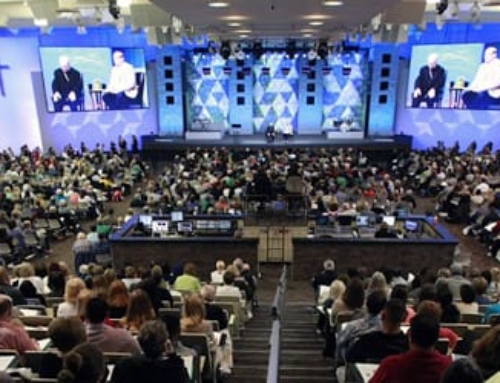Interdependence
Think of the individuals who have shaped your life the most. Who were they? Was it a teacher, a coach, a parent or another family member? Although we speak of self-made individuals, the reality is that all of us have been shaped by our past and present relationships: whether for good, or for evil.
As a parent, you will inevitably have that moment when you say to yourself, “I sound just like my mother” or “that’s exactly what my father would have done.” Those influences are stamped so deeply in us, that they have become part of our own responses. Their words and adages have become part of our lexicon. Much to my own children’s vexation, they have often heard me repeat the same “Dad jokes” I heard from my Dad when I was a nine-year-old boy.
We continually return to the things we learned from our coaches, our mentors, and our favorite teachers. We apply the principles they taught us to the new situations we face. The richness of our relationships has indelibly shaped us. We are social beings with social networks that connect us to our past and our present. Not only have our social networks influenced us, but we also have similar influences on those around us. We are all connected to one another. We were designed to live in community – just like God.
Although we may not have given it much thought, God, himself, is a social being that lives in community. In Genesis 1:26, the text uses the first-person plural to describe God: “The God said, ‘Let us make man in our image, after our likeness. And let them have dominion over the fish of the sea and over the birds …”
Being monotheistic, Jewish rabbis had a difficult time explaining this extraordinary use of a plural pronoun for God. Their general explanation was that this must refer to God in dialog with His angelic hosts. The most plausible view, offered by some scholars, is that this is an instance of God talking to himself. This understanding is even more poignant if God is viewed as a trinity.
In John’s Gospel, Jesus was not only present at creation, he was given credit for it (John 1:3, 4). Although the author of Genesis did intend to infer a trinitarian theology, his usage of “us” in Genesis certainly fits nicely within the framework of the Trinity.
In the New Testament, we see God living in an eternal community. Each member of the Trinity has a social obligation to each other. The Father, the Son, and the Holy Spirit don’t demand attention for themselves, but instead selflessly point to the others. On the Mount of Transfiguration, God the Father said, “This is my beloved Son; listen to him” (Mark 9:7 ESV).
The Father points to Jesus. Jesus never acted independently; he waited for direction: “For I have come down from heaven, not to do my own will but the will of him who sent me” (John 6:38 ESV). In turn, the Holy Spirit testifies about Jesus: “…the Spirit of truth, who proceeds from the Father, he will bear witness about me” (John 15:26b ESV). The spirit points back to the other two. The Trinity is not three independent Gods, but an interdependent community of God. It is this interdependent community that said, “Let us make man in our image.”
As one would expect from a communal God, He created man not to merely live as an independent individual, but to live in community. “So God created man in his own image, in the image of God he created him; male and female he created them” (Genesis 1:27 ESV). Now, God returns to speaking in the first person singular when speaking of himself, but interestingly begins to speak of man in a complementary plurality of male and female. God never envisioned man by himself.
Jewish scholar Nahum Sarna noted that the human community, contained in this verse, is solemnly repeated in Genesis 5:1 – 2.” Indeed, Genesis 5 repeats that telling phrase, that man was created in the image of God and that, “Male and female he created them.” The reality is without creating both, the story of man would last but one generation. The author of Genesis cannot imagine man designed to live in isolation is confirmed by the account of Adam and Eve.
God declared many of His creative acts, “good” (Genesis 1:9, 12, 18, 25). On the final day, God declared that the sum of his creation was “very good (Genesis 1:31). At one point during the creation narrative, God declared that something was not good: “It is not good that man should be alone; I will make a helper for him” (Genesis 2:18 ESV). Human beings living in isolation was not God’s plan.
Adam was designed to be part of a healthy society that functioned like God himself functions in the Trinity. Adam needed Eve. Eve needs Adam. It is only together, that they reflect the image of God.
In the garden, God established obligations that the man and woman had to each other, as well as to Him. In their relationship with God, they were to be fruitful and multiply, have dominion over the earth. “Oh, and by the way, don’t eat that apple.” Together, they were to tend the garden. Humans were to have responsibilities toward God and each other, just as the members of the Trinity have obligations to each other.
God also very clearly established interdependent social obligations between the man and the woman: “Therefore a man shall leave his father and his mother and hold fast to his wife and they shall become one flesh” (Genesis 1:24, ESV). They are not simply two allies that have a common objective, instead they are a single organism, just like the Trinity. God’s intention for human interdependence could not have been stated more bluntly.
God intended for this human interdependence to extend beyond family. It was God’s design that all of humanity be connected and concerned about one another, not just to their immediate families: “…but you shall love your neighbor as yourself: I am the LORD” (Lev. 19:18, ESC).
It is not until the teachings of Jesus, that this command is explicitly elevated to equality with the command to “Love the LORD your God” (Deut. 6:5). In this command, we see that human beings have an obligation to love themselves. But our obligations don’t end there. We have a social obligation to take care of each other.
In the Bible, “love” is not a sentimental feeling. Love is both an action, and a choice, that results in a benefit for another individual. In the midst of the Levitical law, God had given a series of commands regarding taking care of the poor. God established gleaning laws so that the poor and the foreign alien could gather food to eat (Lev. 19:8-12).
The wealthy were told to pay fair wages to the poor and pay them in a timely manner (Lev. 19:15-14). Lastly, judges were not to render biased verdicts against someone just because they were poor and voiceless (Lev. 19:15-16). It is after enumerating these rules for taking care of the disadvantaged, that God said, “Love your neighbor as yourself.” The implication is that the poor are our neighbors and we are obligated to take care of them. It’s not optional.
God says we do have an obligation to take care of ourselves and feed ourselves, but we also need to feed our neighbors. We must first take care of ourselves, because if we don’t do this, we will not be able to take care of others. But once we have taken care of our essential needs, we are to love our neighbors.
God envisions not living only in a family next to neighboring families, but living in a devoted and compassionate society. In God’s calling of Abraham, he promised to him a “great nation.” (Gen. 12:2). The entire nation of Israel became God’s people: “For you are a people holy to the LORD your God. The LORD your God has chosen you to be a people for his treasured possession, out of all the peoples who are on the face of the earth” (Deut. 7:6 ESV).
They would be a blessing to others because Israel would be a society bent on the common good. It would be a society in which every member was faithful and loyal to all the other members. God knows that if individuals are hurting in society, all of society suffers; but if society is blessed, every individual will be blessed as well.
Notice that God has chosen to work through a group of people: not just Abraham, but his descendants, who became a “great nation.” God works in groups. It is through the people of Israel that “all other nations will be blessed” (Gen. 22:18 ESC). The blessing upon Israel was to affect every other nation, because they are every individual— and every people group is linked together. Humanity is Divinely connected.
In the Old Testament, the wisdom of community is extolled often: “Two are better than one, because they have a good reward for their toil. For if they fall, one will lift up his fellow. But woe to him who is alone when he falls and has not another to lift him up! Again, if two lie together, they keep warm, but how can one keep warm alone? And though a man might prevail against one who is alone, two will withstand him—a threefold cord is not quickly broken” (Ecc. 4:9 -12 ESV).
The writer here is describing synergy that comes from interdependence: humans are better together.
Solomon realized that no one person has all the answers. Despite his unparalleled wisdom, King Solomon understood his own limits. We benefit from listening to other people’s diverse experiences and varied perspectives. Without many eyes and minds on a problem, we are bound to miss something: “Plans fail for lack of counsel, but with many advisers they succeed (Prov. 15:22 ESV). In fact, it is only a fool who refuses to get advice from others (Proverbs 12:15). It turns out, that alone, we are not nearly as smart as we thought we were.
In the Old Testament, we receive a hint of the type of interdependent society God had envisioned when he told Israel that if they followed His commands, “…there will be no poor among you” (Deuteronomy 15:4, ESV). A mere seven verses later, God acknowledged that that type of community will never be realized in Israel: “For there will never cease to be poor in the land” (Deuteronomy 15:11 ESV). We are finally able to see the type of society, God envisioned for humanity, realized in the New Testament church.
In the New Testament, God begins working through a New People of God – the Church. Jesus told his disciples that he “would build his Church” (Matt. 16:18). Jesus never spoke of being someone’s personal savior. Yes, he did save individuals, but then they were brought into the group. Jesus created no model of there being just “me and Jesus.” Christ followers were warned not to neglect meeting “together, as is the habit of some, but encouraging one another, and all the more as you see the Day drawing near” (Hebrews 10:25 ESV).
It is in the church where God’s design for interdependence was finally realized. Members of the early church saw themselves as stewards of their belongings, not as owners. As such, they willingly shared what they had with those who had need: “And all who believed were together and had all things in common. And they were selling their possessions and belongings and distributing the proceeds to all, as any had need.” (Acts 2:44, 45, ESV). These verses are not advocating Communism. Instead, they provide proper understanding of stewardship and interdependence.
This attitude toward belongings reappears in Acts chapter 4: “Now the full number of those who believed were of one heart and soul” [divine community, society as God intended] and no one said that any of the things that belonged to him was his own, but they had everything in common” (Acts 4:32 ESV). The phrase “had everything in common” is identical to the phrase in Acts 2:44.
St Luke continues, “There was not a needy person among them, for as many as were owners of lands or houses sold them and brought the proceeds of what was sold and laid it at the apostles’ feet” (Acts 4:34,35a, ESV). Nearly every New Testament commentator saw the phrase “not a needy person among them” is an intentional allusion to “no poor among you” (Deut. 15:4). It is in this type of interdependent community, with the proper stewardship of our possessions, that is God’s ideal for humanity has been finally reached.
Interdependence not only implies social obligation, but also that connection with each member makes a contribution to the whole. With interdependence, there is synergy: the whole is greater than the sum of its parts. The members need each other. When one member does not contribute, the entire system is affected. What every individual does affects every other individual. Smoking doesn’t merely affect the smoker. Second hand smoke is nearly as deadly for the bystanders. One person eats a bat and the entire world suffers a pandemic. Whether we like it or not, we are inextricably linked together.
The idea of Jesus merely being a Personal Savior would have been foreign to Jesus’ own mind. In teaching his disciples how to pray, he didn’t say, “My Father, which is in Heaven,” but “Our father.” Christianity is never viewed as an individual exercise, but a team sport. In Romans, Paul declares that the many are actually one: “so we, though many, are one body in Christ, and individually members one of another” (Romans 12:5, ESV).
The concept of Jesus being a Personal Savior would have been foreign to Paul as well. Yes, Jesus saves the individual, but then the individual becomes part of a bigger group – the church. When we are saved, we enter God’s design for our lives: interdependent community. Paul had no concept of salvation apart from community. Part of the salvation process is delivering us from our own selfishness: “Love one another with brotherly affection. Outdo one another in showing honor…Contribute to the needs of the saints and seek to show hospitality” (Romans 12:9, 10, 13, ESV).
We are designed to be together.
In Paul’s teachings on spiritual gifts, he highlights the synergy of Christian community. After stating that each person has his own unique spiritual gift (I Cor. 12:4-6), Paul told us because of our diversity, we are better together: “To each is given the manifestation of the Spirit for the common good” (I Corinthians 12:7, ESV).
Then he gave us a concrete illustration of how this synergy, or what he calls the “common good,” works. “If the whole body were an eye, where would be the sense of hearing? If the whole body were an ear, where would be the sense of smell? . . . as it is, there are many parts, yet one body” (I Cor 12:17, 18, 20, ESV). The gifts we have are not for our own benefit. They are for the benefit of the group. Because each person has different abilities, then just like our physical bodies, we need each other.
We are all part of the same body. “If one member suffers, all suffer together if one member is honored, all rejoice together” (I Cor 12:26, ESV). Our human connection was to reflect the divine connection in the Trinity. Although this ideal is realized in the church, it was God’s intention that this sense of interdependent connection, this loving of our neighbor was to be realized in all of society.
That was God’s intention for Israel, but Israel never attained it. As a result, the other nations were not blessed. Finally, in the church, we see divine community realized. Finally, there is synergy. And God’s design is that this community is realized everywhere and that everyone is connected.
This is a hard concept for the Western mind that elevates individualism. It is much more aligned with Eastern thought. Eastern culture holds the understanding that one individual brings honor and shame to the group. The Eastern mind values the group over the individual, so that it is important for individuals to yield their desires for the good of the group. That is a tough pill to swallow.
The Bible, however, is ambiguously clear. No man is an island. Being created in the image of God, means we are bound to our brothers. To love our neighbors as ourselves, means that there is not only individual responsibility to take care of ourselves, but there is also social responsibility. For us to truly be better together, each of us must be determined to work for the “common good.” As the Apostle Paul said, “Rather, in humility value others above yourselves, not looking to your own interests but each of you to the interests of the others” (Philippians 2:3b,4 NIV).
It is only when we are interdependent, that we can reach God’s full potential individually, as a church, and as a society.
Footnotes:
- Nahum Sarna, The JPS Torah Commentary on Genesis, The Jewish Publication Society, Philadelphia, 1989, page 12.
- Victor P. Hamilton, The Book of Genesis: The New International Commentary of the Old Testament. Eerdman’s Publishing, 1990, page 134.
- Sarna, page 13.
- Luke T. Johnson, The Acts of the Apostles: Sacra Pagina pg 86. I Howard Marshall, Acts of the Apostles: Tyndale New Testament Commentary, pg. 109.
- Richard N. Longnecker, Acts: The Expositors Bible Commentary with the New International Version, pg 106; Ben Witherington III, The Actos of the Apostles: A Socio-Rhetorical Commentary, pg 207. Darrel L. Bock, Acts: Baker Exegetical Commentary on the New Testament, pg 214.







